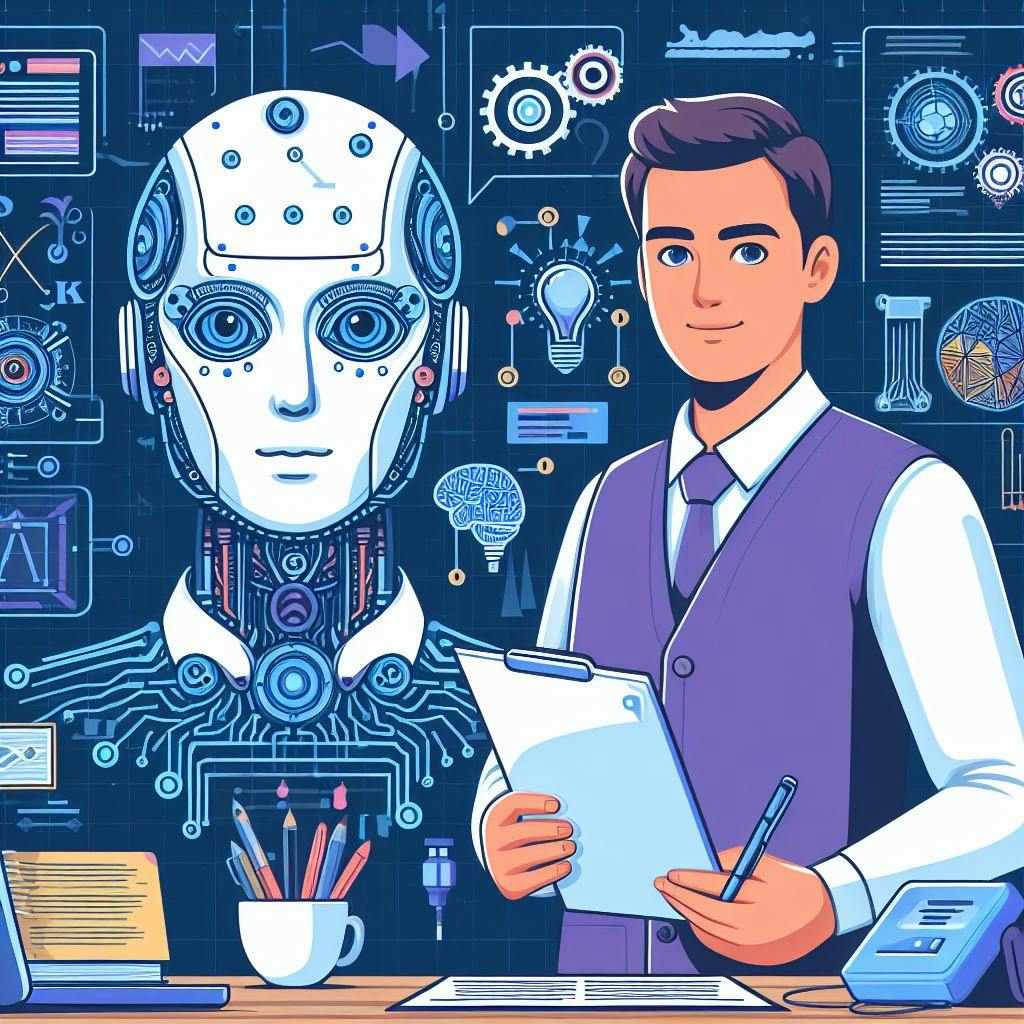Table of contents
- What is AI?
- What Does an AI Engineer Do?
- Do I Require a Degree to Pursue a Career as an AI Engineer?
- How to Become an AI Engineer in 5 Steps:
- Mastering the Fundamentals of Computer Science
- Learning a Programming Language (Python)
- Mastering Foundational and Advanced AI and Machine Learning Concepts
- Mastering Data Handling in Machine Learning
- Discovering LLMs (Large Language Models)
- Develop a Portfolio and GitHub Profile to Showcase Your Skills
- Acquire Hands-On Experience through Project Engagement
- Seek Employment Opportunities
- Prepare for the Technical Interview
Unless you've been completely out of the loop, you've probably noticed the buzz surrounding Artificial Intelligence (AI) over the past year and a half.
It seems like everywhere you turn, there's talk about ChatGPT making waves, and suddenly every company out there is either boasting about their AI capabilities, claiming to be 'AI-powered,' or setting their sights on integrating AI features in the near future.

This isn't just a passing trend; it's a rapidly expanding industry with immense potential.
By the end of 2024, the AI market size is projected to hit a staggering $305.9 billion. And by 2030, experts estimate it could soar to an eye-popping $738.8 billion. To put that into perspective, let's compare it to some other tech sectors:
Web 3.0: Expected to grow from $0.4 billion in 2024 to $5.5 billion by 2030.
Machine Learning: Projected to increase from $26 billion in 2024 to $225 billion by 2030.
App Development: Anticipated to rise from $167 billion in 2024 to $328 billion by 2030.
In contrast, the AI sector's growth trajectory is set to outpace them all, solidifying its position as a powerhouse in the tech industry.
What is AI?
The essence of artificial intelligence (AI) is to develop machines capable of accomplishing tasks that traditionally demand human intelligence, aiming to streamline our lives and enhance efficiency.
Familiar instances of this include self-driving vehicles and chat assistants like Siri. They can interpret commands or inquiries, then provide relevant responses, exemplifying AI's potential to simplify tasks and facilitate smoother interactions.
There are six primary subsets within the realm of Artificial Intelligence (AI):
Machine Learning (ML):
Involves developing algorithms for computers to learn and make predictions or decisions based on data. This encompasses supervised, unsupervised, and reinforcement learning.
Deep Learning:
A subset of ML, it involves creating artificial neural networks with multiple layers, inspired by the structure and function of the human brain.
Computer Vision:
Focuses on enabling computers to understand digital images and videos, enabling recognition of faces, objects, and scenes.
Natural Language Processing (NLP):
Aims to make computers understand, interpret, and even generate human language, facilitating tasks like intent detection, language translation, and speech recognition.
Robotics:
Encompasses a wide range of applications, from factory automation to household robots like Roombas, which navigate and clean homes.
Decision Making:
Involves using AI systems to emulate human decision-making abilities, with applications ranging from medical diagnosis to weather forecasting.
These subsets often intertwine within a single AI system, leveraging various techniques to achieve complex tasks.
What Does an AI Engineer Do?
In a nutshell:
An AI Engineer crafts AI applications using pre-built LLMs (large language models) or other machine learning models.
The detailed version:
Honestly, the answer to this question is still open to interpretation.
Given the rapid evolution of the AI field, the definition of "AI Engineer" varies from person to person.
It's akin to web development jobs.
You can peruse 10 job postings for a 'Web Developer' position, each with different requirements.
Some need HTML/CSS/JavaScript skills. Some seek experience with specific libraries or frameworks like React. Others require expertise in developing mobile apps. Yet, some look for design-related web skills like Three.js. Ultimately, they're all coding web applications, but their tasks vary.
Similarly, AI Engineers may share the same job title, but their duties differ based on their company's AI usage.
Some specialize in specific areas, while others are jacks-of-all-trades. Nevertheless, at their core, they all develop AI applications using LLMs or other machine learning models.
Need a chat assistant? They'll help create it. Want to enhance data processing for better targeting and offers? They've got you covered. However, they don’t work alone.
In fact, much of an AI Engineer's job involves coordinating and collaborating with multidisciplinary teams to complete projects.
They engage with stakeholders, domain experts, users, software developers, ML engineers, data analysts, and data scientists. Hence, both soft skills and technical prowess are crucial for this role.
Here's a typical workflow for an AI Engineer:
Step 1: Problem Definition Collaborate with stakeholders to understand and define the problem and how AI can address it.
Step 2: Data Collection and Preparation Gather and clean data relevant to the problem to train the AI.
Step 3: Ethical Considerations Consider any ethical implications and potential biases that could affect data and user experience.
Step 4: Algorithm Development Select or design algorithms to solve the problem effectively.
Step 5: Programming and Coding Implement algorithms and models using programming languages like Python, Java, or C++.
Step 6: Model Training or Fine-Tuning Train or fine-tune models using data to recognize patterns and make predictions.
Step 7: Integration with Applications Integrate trained models into software applications or systems for testing.
Step 8: Testing and Evaluation Test the model's performance and efficiency before deployment.
Step 9: Deployment Deploy the model into real-world environments in stages, monitoring performance.
Step 10: Monitoring and Maintenance Continuously monitor model performance, updating and improving as needed.
What Sets Apart an AI Engineer from an ML Engineer?
Although the terms are often used interchangeably, there are distinctions.
While both roles share similar skills, ML Engineers focus more on building machine learning models from scratch.
On the other hand, AI Engineers cover all aspects of AI application development and usually leverage pre-built AI models.
For instance:
ML Engineers concentrate on creating and developing AI models.
AI Engineers plan, develop, and implement AI applications/solutions, requiring a broader AI skill set.
Looking back at the AI Engineer's workflow, you can discern the difference:
AI Engineers plan and start developing their applications. They choose machine learning models, often selecting from pre-existing options or collaborating with ML Engineers to build new ones. They fine-tune selected models, test and evaluate them, and integrate them with AI applications. Don't just take my word for it, though.
Do I Require a Degree to Pursue a Career as an AI Engineer?
Absolutely not.
While some FAANG companies might prefer candidates with a degree in Computer Science or Mathematics, the majority prioritize expertise over formal education.
This means that companies value hands-on experience and a portfolio of relevant projects more than just a degree, as it demonstrates practical skills.
However, it's important to note that due to the rapidly changing nature of the industry, continuous learning and staying updated are essential, regardless of your educational background.
This holds true for all sectors of the tech industry.
How to Become an AI Engineer in 5 Steps:
Learn the practical skills needed for the job (like AI fundamentals and programming).
Develop a portfolio and a GitHub profile to showcase your abilities.
Gain hands-on experience by working on projects and add them to your portfolio.
Apply for jobs.
Prepare for technical interviews.
The time required varies depending on your weekly commitment:
If you can dedicate 40-80 hours per week, you could complete it in just 2-3 months.
With 20-40 hours per week, it might take around 4-6 months.
If you can only spare 1-10 hours per week, expect it to take 7-12 months.
Compare that to the traditional 40 hours per week for 8 years and $80,000 in debt.
Mastering the Fundamentals of Computer Science
Build a robust comprehension of data structures and algorithms. This foundational knowledge not only enhances your overall understanding but also boosts your performance in technical interviews (more details on this later).
These concepts frequently arise during interviews, making it crucial to learn them—even if you may not use them in your daily tasks.
Learning a Programming Language (Python)
While AI Engineers may utilize Python, Java, or C++, Python is predominantly encountered in the field.
Moreover, Python serves as an accessible introductory language. So, even if you eventually delve into others, starting with Python allows you to gain momentum, with the option to explore additional languages later on.
Mastering Foundational and Advanced AI and Machine Learning Concepts
To embark on this journey, you'll need to grasp the basics of machine learning, encompassing algorithms and models. Additionally, delve into specific AI subfields like natural language processing, computer vision, and robotics.
To navigate these realms effectively, proficiency in a programming language is essential. Python stands out, especially within the AI community, for its user-friendly syntax and rich libraries tailored for machine learning and data science applications.
Mastering Data Handling in Machine Learning
Get acquainted with renowned AI frameworks and libraries such as TensorFlow, PyTorch, and scikit-learn.
These powerful tools streamline the deployment of intricate AI models and algorithms, offering insights into the realm of Deep Learning.
Discovering LLMs (Large Language Models)
Large Language Models, like those powering ChatGPT, are gaining immense traction. It's worthwhile to delve into their workings. Follow courses from and get more insights
https://www.deeplearning.ai/short-courses/
Feel free to explore these courses to enhance your knowledge.
Furthermore, keep an eye out for new AI tools tailored to your role. Conduct a quick Google search periodically to uncover innovative tools and experiment with them.
Develop a Portfolio and GitHub Profile to Showcase Your Skills
As mentioned earlier, many tech companies prioritize demonstrated abilities when hiring, so it's essential to showcase your capabilities.
This involves crafting a project portfolio and establishing a GitHub profile to exhibit your work. Populate these platforms with pertinent examples highlighting your expertise.
Acquire Hands-On Experience through Project Engagement
Acquiring hands-on experience through project engagement is invaluable for aspiring professionals in any field, particularly in the tech industry. While theoretical knowledge is essential, practical application solidifies understanding and fosters proficiency. Engaging in projects allows individuals to confront real-world challenges, apply theoretical concepts, and develop problem-solving skills. Moreover, it provides an opportunity to collaborate with peers, iterate on ideas, and receive constructive feedback, ultimately refining one's craft. Additionally, employers highly value candidates with a proven track record of project involvement, as it demonstrates initiative, adaptability, and the ability to deliver tangible results. Therefore, actively participating in hands-on projects not only enhances technical skills but also enhances employability and sets individuals apart in a competitive job market.
Seek Employment Opportunities
While some suggest pursuing internships for in-person experience, it's worth considering whether they align with your goals. Unless it's a dream company or you're still in your teenage years, internships might not be the most effective route. Instead, focus on applying for junior AI Engineering roles. Not only does this provide hands-on experience, but it also offers better compensation.
Prepare for the Technical Interview
If you're venturing into your first programming or technical role, it's crucial to understand the unique nature of interviews in the tech industry. Unlike other sectors, tech companies prioritize practical skills over degrees or certificates. Therefore, they assess your abilities through multiple stages of interviews.
The typical process includes:
An initial online quiz upon application, serving as an initial filter to sift through numerous candidates.
A basic coding assessment completed remotely from home.
An in-person technical interview focusing on AI-specific questions, which may delve deeper into data structures and algorithms.
Possibly a final project simulating real-world tasks to evaluate your work approach and timeliness.
Lastly, a behavioral interview to gauge your fit within the team dynamics.
The technical interview can be the most challenging part, often covering AI, data structures, and algorithms—areas that self-taught AI Engineers may overlook. However, with proper preparation, including the recommended courses, you'll be well-equipped to tackle these questions and secure a role as a novice AI Engineer!
More such articles:
https://www.youtube.com/@maheshwarligade

